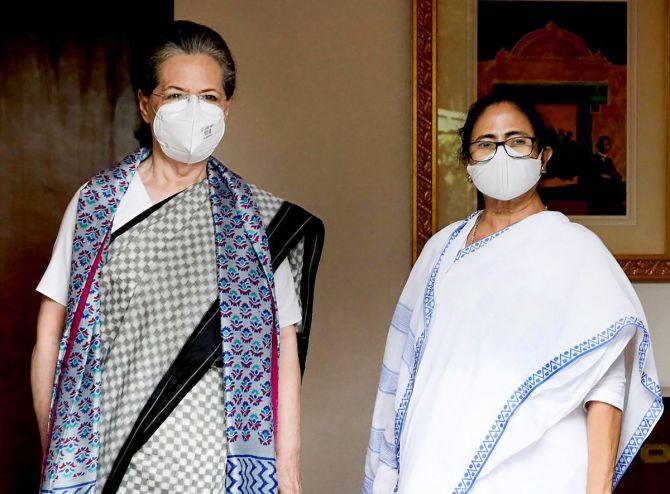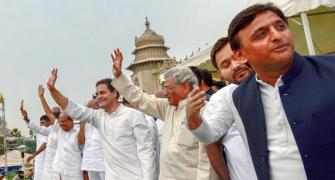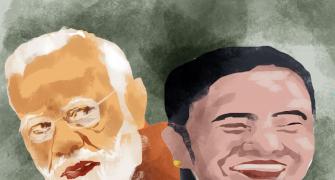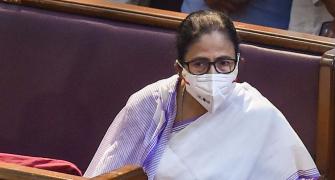The fear that Mamata might snatch the mantle of Opposition leadership which the Gandhis firmly believe to be theirs by birthright seems to have persuaded Sonia and Rahul to give up their hoity-toity ways, observes Virendra Kapoor.

In substantive terms Mamata Banerjee's five-day visit to Delhi last week may not have achieved much.
But in some ways it could be said to have sowed the seeds of broader Opposition unity with the singular objective of bringing together anti-BJP parties under a common umbrella.
Coming to the national capital after a gap of two years, the West Bengal chief minister and head of the Trinamool Congress renewed contacts with leaders of most Opposition parties, including the Congress.
Without doubt, Mamata's was an exploratory mission.
Following her recent victory in the West Bengal assembly poll she is riding high.
It was natural for her to harbour ambitions of playing a bigger role on the national stage.
Public memory is rather short. It is not that she has exposed her hand for the first time.
In the 2014 Lok Sabha poll, encouraged by her then confidant K D Singh, whom she nominated twice to the Rajya Sabha, not only did Mamata field Trinamool Congress candidates outside West Bengal but she also arranged to address public rallies as well.
It is a matter of record that Biswajeet, a Bengali actor popular in Bollywood in the 1970s and 1980s, contested from the New Delhi constituency on the Trinamool ticket and failed to get into four figures.
In the same election Mamata scheduled a public rally in Ramlila Maidan. The Trinamool chief waited anxiously for the audience to show up, but when nobody did she abandoned it at the last moment.
So last week when she sought to fob off the question whether she would lead the proposed Opposition front with a non-committal answer, 'It depends on the situation... I can't impose my will... I have a sweet home in Bengal,' take her response with more than a pinch of salt.
Of course, she harbours prime ministerial ambitions. And there is nothing wrong in it. After all, you are in politics for power, never mind the pious commitments from the public pulpit about service of the people etc.
Public service comes second, if at all, way behind the pursuit of power, naked power.
And Mamata is no exception to that cardinal rule of present-day politics.
In her quest for fulfilling her ambition to replace Narendra Modi as prime minister in 2024 she met leaders of the Congress, NCP, RJD, DMK, AAP, etc.
In between those meetings, she paid a 'courtesy call' on Modi, describing the 35-minute powwow as cordial.
She wouldn't say whether the on-going Pegasus controversy came up for mention at the meeting with Modi, though this was the issue which immediately bound her party and other Opposition groups into a united front against the government in and out of Parliament.
On Pegasus itself, Mamata quite unwittingly may have eased the way out for the government for it wriggle out of the ongoing impasse.
By unilaterally setting up a two judge panel under the Commission of Inquiry Act, 1952, to be headed by former Supreme Court judge Madan Lokur with former Calcutta high court chief justice Jyotirmay Bhattacharya as member, she virtually voided the Opposition demand for a parallel commission by the Centre.

Now that the Pegasus matter has been dragged before the Supreme Court, the government may take shelter behind the West Bengal commission and argue that we should wait for its report.
Or it could plead that the West Bengal government was not competent to set up such a commission of inquiry since the alleged breaches of law concerned the central domain such as telecom, telecommunications, wireless, broadcasting, etc.
The apex court is scheduled to take up the case this week, but Mamata's unilateral decision has certainly not helped the Opposition cause.
Ironically, Mamata's barely disguised ambition for playing a national role has had an unintended effect.
Insofar as her exertions jolted the slumberous Gandhi parivar into decisive action it may prove good for the Grand Old Party.
By all accounts, Rahul Gandhi was far more accessible to Opposition MPs in this session than at any time before in his parliamentary career.
The lurking fear that Mamata, or even Sharad Pawar, might snatch the mantle of Opposition leadership which the Gandhis firmly believe to be theirs by birthright seems to have persuaded Sonia Gandhi and son Rahul to give up the hoity-toity ways and try and reach out to leaders of other Opposition groups.
The Gandhis now want to set their own house in order.
Thanks to the commonsensical advice from the high profile Prashant Kishor, who met the Gandhi siblings twice recently, the confusion and drift in the state units of the Congress is sought to be ended with firm handling.
Navjot Singh Sidhu's nomination as the Punjab unit chief was an attempt to settle the simmering discord between him and Chief Minister Amarinder Singh.
The CM may enjoy a deep contact with older Congressmen but the cricketer-turned-funster-turned politician attracts young voters.
Likewise, the long-standing discord in Rajasthan between Chief Minister Ashok Gehlot and Sachin Pilot is sought to be settled soon with the expansion of the ministerial team as well as a suitable role for the latter at the AICC level.
Even in Chhattisgarh the party may not have the option to look the other way as Chief Minister Chief Minister Bhupesh Baghel and Health Minister T S Singh Deo spar and scar the party image publicly.
In other words, Mamata's first foray into national politics after winning the assembly poll thrice in a row may have barely caused anyone in the BJP to lose his sleep, especially when she was expected to try and forge a united Opposition front.
But it has certainly jolted the long complacent Congress leadership into action since it is loath to forgo the role of 'first among equals' and, therefore, claim the mantle of leadership of any group that might emerge after the proposed coalescing together of various anti-BJP outfits, big or small.
Feature Presentation: Aslam Hunani/Rediff.com









